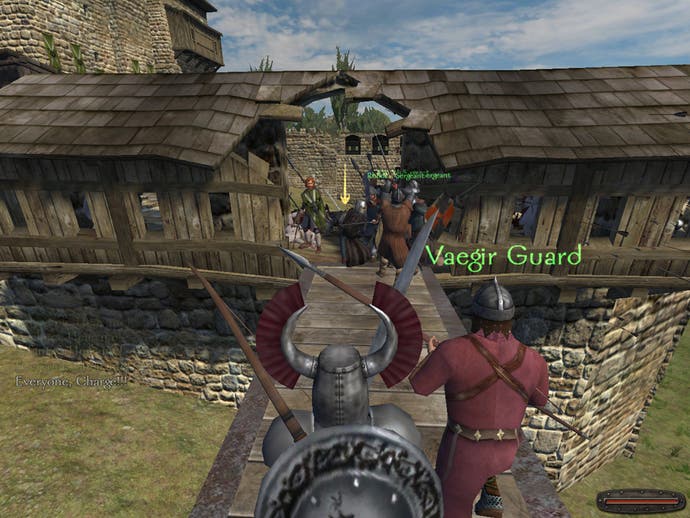PC Roundup
Shadowgrounds Survivor, Mount & Blade, Sherlock Nemesis, Belief & Betrayal, Pro Cycling Manager.
Mount & Blade
- Developer: Taleworlds
- Publisher: Paradox Interactive
I wanted to like Mount & Blade more than I eventually did. I love the concept behind it, I applaud the attempts to shake up a genre that is rapidly settling into tired habits, and I'm drawn to its take on open-ended gameplay. But I'm getting ahead of myself...
Although it sounds like some new wonder product from Gillette, Mount & Blade is an RPG. Despite superficial similarities to other third-person role-players, it offers an admirably different brand of dice rolling. There's no story, for instance, or at least no pre-defined main quest to form the backbone of the experience. You create your character, set their base stats, and are dropped into the world of Calradia with a horse, basic weaponry and some goods to trade. What happens from there onwards is entirely up to you, not some scriptwriter.
Calradia is a feudal medieval world of the sort familiar to most RPG players, but there's another key difference here. There's no magic. No monsters. No fantasy elements at all. This is a realistic depiction of a fictional Middle Ages land, the sort of thing Tolkien would have come up with if he trimmed away all the orcs, dwarves and elves. There's an authenticity here, a maturity even, that suggests the genre may be ready to move on from adolescent monster mashing and into something with a bit more historical heft.
Classes and combat are also areas where expected systems fail to transpire. You choose a rudimentary backstory for your character, which helps to shape your initial abilities, but it's really up to you how you develop in the future, with no rigid class system telling you what you can and can't learn. Likewise, combat doesn't just rely on backstage stat rolls. A simple, effective mouse system puts a variety of offensive and defensive moves at your fingertips, which are realised with no small amount of swashbuckling flair. Damage dealt and received depends as much on the angle and speed of the attack - your skill, in other words - as the character's core statistics. You can also fight just as easily on horseback. Taking a galloping swipe at a bandit as you thunder past him or planting arrows in a pursuing soldier is immensely satisfying.

In concept, then, Mount & Blade has much to recommend to the RPG player looking for something different. In reality, these bold ideas are undersold by a poor game engine, which makes basic exploration and interaction an often thankless task. NPCs parrot the same lines of text, and although there are hundreds of towns and villages, most end up feeling like copies of the same place. Even something as simple as dismounting from your horse becomes a fiddle, as you shuffle about finding a spot of terrain that will let you get down, while the frankly terrible graphics engine does little to entice you deep enough to discover the game's robust trading opportunities and the epic battles that come when you build up your own army.
There are foundations here for something really quite special, but in its current state the game is nowhere close to delivering on its promises. With an enthusiastic community of mod builders and some shrewd patches from the developer, Mount & Blade could evolve into a game more deserving of your time. Right now, it's only suitable for those willing to make the best of a flawed experience.
5/10
